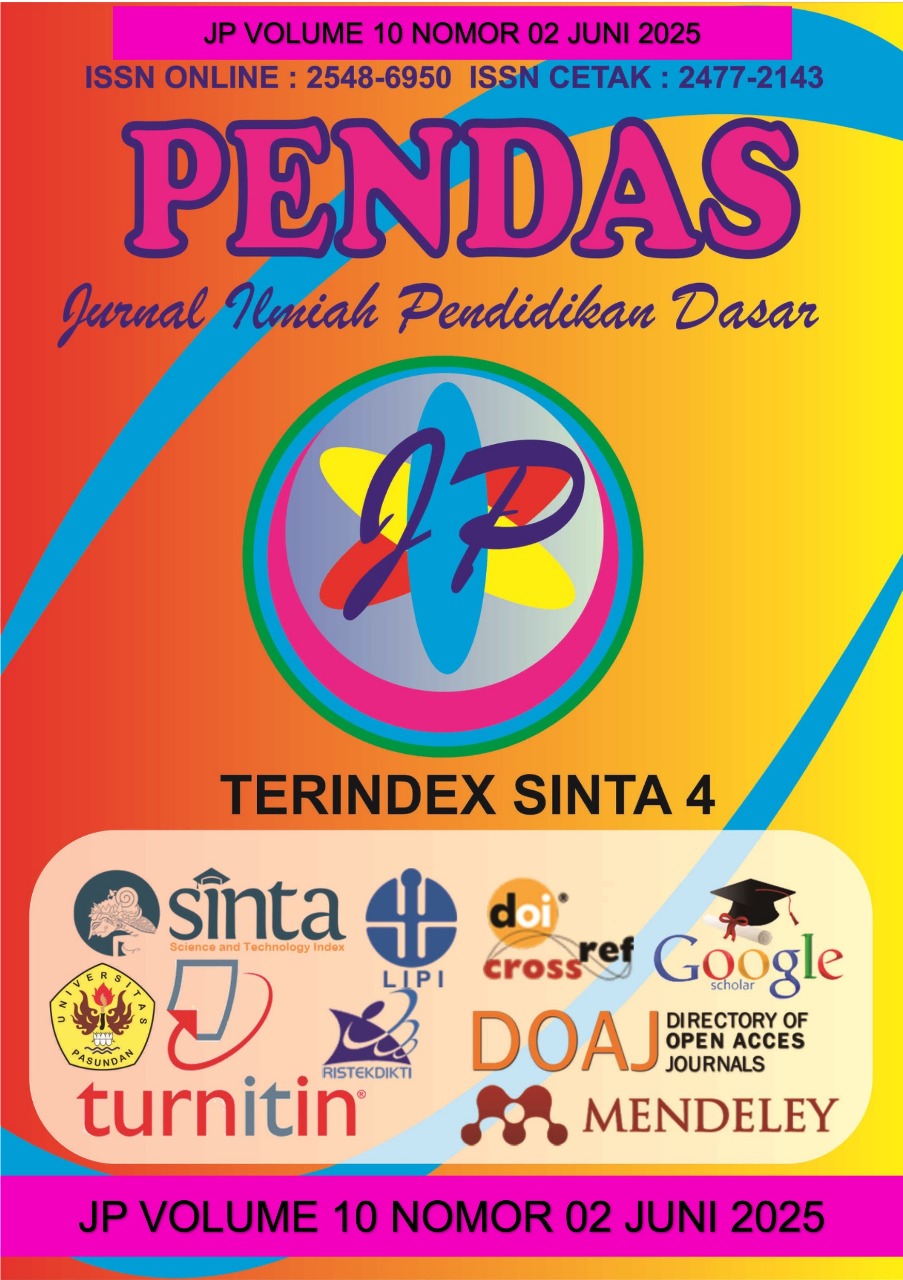PENINGKATAN LITERASI SAINS MATERI PERUBAHAN ENERGI MELALUI MODEL INKUIRI TERBIMBING BERBANTUAN METODE EKSPERIMEN SEDERHANA KELAS 4 SDN TANJUNG JATI 2
DOI:
https://doi.org/10.23969/jp.v10i02.24809Keywords:
Keywords: science literacy, guided inquiry, simple experiments, energy transformation, elementary educationAbstract
ABSTRACT
This classroom action research examined the effectiveness of guided inquiry model assisted by simple experiments in enhancing science literacy on energy transformation material among fourth-grade students at SDN Tanjung Jati 2. The research implemented Kemmis and McTaggart's cyclical model involving 19 students through a two-cycle intervention conducted in April 2025. The pre-cycle data revealed critical deficiencies in students' science literacy with only 21% achieving mastery. After implementing guided inquiry with simple experiments such as hand-rubbing, candle-lighting, and balloon-blowing in the first cycle, average scores increased from 59 to 69 with 47% mastery. The second cycle incorporated interactive videos, educational songs, and gamification, resulting in significant improvement with average scores reaching 80 and 89% of students achieving mastery, exceeding the 85% target threshold. Systematic observations documented improvements in both teacher performance (from 68 to 85 points) and student engagement (from 33 to 44 points). The guided inquiry approach facilitated critical thinking development through systematic investigations, while hands-on experiments strengthened conceptual understanding by providing concrete experiences of energy transformations. This research demonstrates that integrating guided inquiry with contextual experiments and interactive media effectively cultivates scientific thinking skills and comprehensive science literacy among elementary students.
Downloads
References
Alamsyah, W. N. S. (2024). Revolusi Ketenagalistrikan: Mengintegrasikan Teknologi Untuk Efisiensi Energi. WriteBox, 1–13. https://writebox.cloud/index.php/wb/article/view/168%0Ahttps://writebox.cloud/index.php/wb/article/download/168/168
Espinoza, F. (2020). Impact of Guided Inquiry with Simulations on Knowledge of Electricity and Wave Phenomena. European Scientific Journal ESJ, 16(33), 1–35. https://doi.org/10.19044/esj.2020.v16n33p1
Fahlevi, A., Jumadi, J., Dewi, A. N., & Sari, F. P. (2022). Development of Electronic Student Worksheet Based on Guided Inquiry on The Topic of Photosynthesis. Jurnal Penelitian Pendidikan IPA, 8(3), 1408–1415. https://doi.org/10.29303/jppipa.v8i3.1674
Hasanah, H. Al, Nursabrina, F., & Made, I. (2024). Improving Science Literacy Using a Guided Inquiry Learning Model Assisted by Interactive Modules on Elattice Materials. 15(3), 331–337. https://doi.org/10.26877/jp2f.v15i3.20506
Herlina, W., Hidayat, T., & Rahman, T. (2022). Effect of Green School-Based Inquiry Learning Model on Students’ Ability of Scientific Literacy. Jurnal Penelitian Pendidikan IPA, 8(5), 2513–2517. https://doi.org/10.29303/jppipa.v8i5.1847
Jofi Kuswanto, Muh. Nasir, & Ariyansyah, A. (2021). Pengaruh Model Pembelajaran Guided Inquiry terhadap Kemampuan Literasi Sains Siswa Kelas X pada Materi Keanekaragaman Hayati di SMA Negeri 1 Wera Tahun Pelajaran 2021/2022. Jurnal Pendidikan Mipa, 11(2), 175–180. https://doi.org/10.37630/jpm.v11i2.463
Kalkan, Ö. K., Altun, A., & Atar, B. (2020). Role of teacher-related factors and educational resources in science literacy: An international perspective. Studies in Educational Evaluation, 67(February). https://doi.org/10.1016/j.stueduc.2020.100935
Laia, E. (2023). Analisis Struktur Teks Laporan Observasi Siswa Kelas X Sma Negeri 2 Susua Tahun Pelajaran 2021/2022. KOHESI : Jurnal Pendidikan Bahasa Dan Sastra Indonesia, 3(2), 13–23. https://doi.org/10.57094/kohesi.v3i2.848
Marwanti, K., Marina, D., & Astra, I. M. (2024). Increasing Scientific Literacy using a Guided Inquiry Approach assisted by PhET Simulations in Wave Material. 15(4), 355–360. https://doi.org/10.26877/jp2f.v15i4.715
Mentari, R., Syamsi, A., Atikoh, N., Eksperimen, P. M., Journal, I., & Elementary, O. (2023). Pengaruh Penggunaan Metode Eksperimen Terhadap Literasi Sains Dalam Mata Pelajaran IPA Materi Sifat-Sifat Cahaya Kelas IV. 3(2), 75–89.
Nurfahurrahmah, N., Ariyansyah, A., Suryani, E., & Herman, H. (2024). Giat Literasi Sains Melalui Metode Eksperimen Sederhana Pada Siswa SD dan SMP. Jompa Abdi: Jurnal Pengabdian Masyarakat, 3(2), 95–100. https://doi.org/10.57218/jompaabdi.v3i2.1109
Nurhayati. (2019). MENINGKATKAN KUALITAS HASIL BELAJAR SISWA PADA MATERI ENERGI BUNYI MELALUI PENERAPAN PENDEKATAN PEMBELAJARAN SAINTIFIK BERBASIS METODE EKSPERIMEN D I KELAS IV SD INPRES PERUMNAS. 3, 26–46.
Rustono, Sumarno, & Achmad Buchori. (2023). Pengembangan Electronic Book Berbasis Stem Untuk Meningkatkan Literasi Sains Materi Energi Dan Perubahannya Pada Siswa Kelas Iv Sekolah Dasar. Didaktik : Jurnal Ilmiah PGSD STKIP Subang, 9(3), 372–388. https://doi.org/10.36989/didaktik.v9i3.1546
Sakti, I., Nirwana, N., & Swistoro, E. (2021). Penerapan Model Project Based Learning Untuk Meningkatkan Literasi Sains Mahasiswa Pendidikan Ipa. Jurnal Kumparan Fisika, 4(1), 35–42. https://doi.org/10.33369/jkf.4.1.35-42
Siregar, A. N., Prasetyo, Z. K., Jumadi, J., & Paramitha, D. (2023). Effectiveness of Using Guided Inquiry-Based E-LKPD on Global Warming Material to
Downloads
Published
Issue
Section
License
Copyright (c) 2025 Pendas : Jurnal Ilmiah Pendidikan Dasar

This work is licensed under a Creative Commons Attribution 4.0 International License.














































